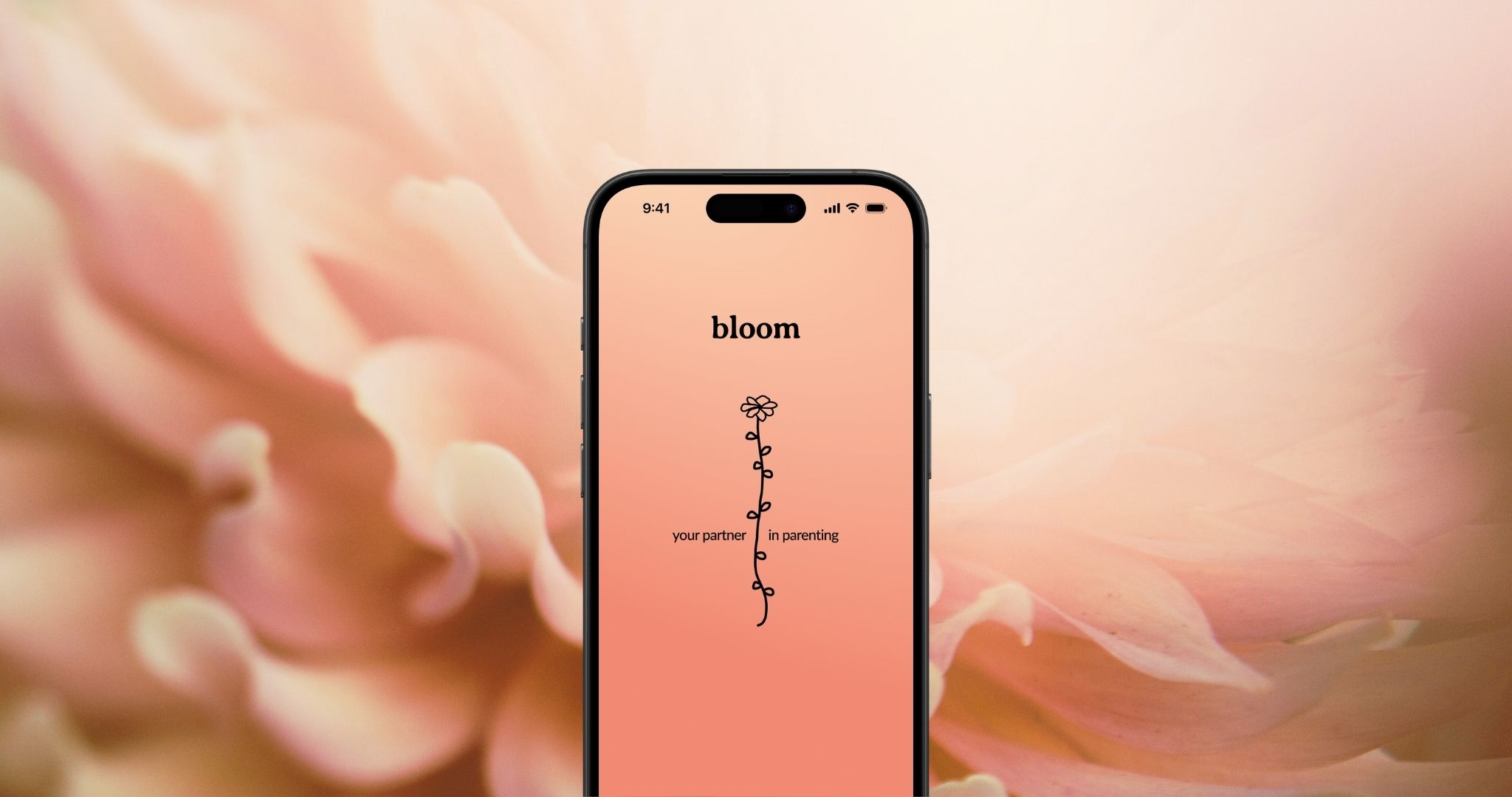
Parenthood is one of life’s most rewarding journeys—but it is also one of the most overwhelming.
Between managing daily tasks, planning for the future, and sifting through an endless sea of online information, parents often find themselves lost in the chaos. Many struggle to balance the immediate needs of their child with their personal goals, financial independence, and emotional well-being.
The challenge is not just about finding the right information but also about feeling supported and confident in their choices.
The Bloom concept was developed to address these struggles. Thinking of how to bring our responses to the challenges together in a holistic way, we decided to think of it as a digital platform, or an app.
But Bloom is more than just a parenting app; it’s a proposal for a trusted digital companion to help parents organise, plan, and regain control over their journey. From navigating parental leave paperwork and setting savings goals to tracking milestones and simplifying daily routines, Bloom aims to transform uncertainty into clarity.
It is a way to provide parents with structured, personalised, and actionable guidance, ensuring that they feel supported—not judged—as they navigate both the everyday and the long-term aspects of parenting.
Designing a parent-centred solution
We followed a research-driven, user-first process to shape Bloom. Starting with 28 interviews across seven countries, we grounded the concept in diverse parental perspectives and developed guiding principles.
Through workshops we explored innovative yet practical ideas, which informed detailed personas and user stories. These shaped a wide set of potential features, later refined into Bloom’s four key features.
We visualized these in wireframes and a prototype landing page, tested with 14 parents and 99 survey respondents, whose feedback was essential in refining the concept into its final form.
Understanding the challenges parents face

Through the extensive research, interviews, and focus groups, we uncovered two major struggles that parents consistently experience:
- Loss of agency. Many parents feel that their personal aspirations and sense of self take a backseat to the immediate needs of their child. The overwhelming flood of responsibilities often makes it difficult to think and act with a long-term perspective, especially when time and energy are scarce. Parents describe feeling as though they are simply reacting to each day rather than actively shaping their family’s future.
- Gaps in support, trust, and reliable information. While parents seek trustworthy advice, they also crave emotional reassurance. Yet many find themselves isolated, navigating complex bureaucratic systems and conflicting online opinions on their own. The uncertainty of whether they are making the right decisions for their child can be overwhelming.
During our research, parents expressed these frustrations in their own words:
“At the moment, it’s difficult to actually enjoy being a parent.”
“The biggest challenge is that you’re not sure if you’re doing things right. Expert advice and motivation would be a big plus.”
“I wish there was a clear checklist that helped with financial and bureaucratic planning.”
These insights formed the foundation for Bloom’s conceptual development. We asked ourselves: How might we help parents regain control over their lives? How can we empower them to balance both their short-term tasks and long-term aspirations? And how do we ensure that they feel supported rather than judged?
A life stage for long-term thinking

The early stages of parenthood are often viewed as a time of adaptation and survival, yet they also represent a critical window for long-term planning. While parents are deeply engaged in managing daily responsibilities, they are also highly motivated to secure a better future for their children. This life stage presents a unique opportunity to introduce solutions that help parents balance immediate needs with forward-looking financial and life planning.
One of the most powerful insights from our research is how parents light up when envisioning their child’s future—from ensuring better education to creating a stable financial foundation. Their aspirations go beyond day-to-day survival; they actively seek ways to build security, stability, and opportunities for the years ahead.
This mindset shift creates a pivotal moment for innovation. We explored how integrating financial tools, strategic planning resources, and comprehensive support systems into this stage of life, can have immense potential to reshape the way families prepare for the future. Solutions designed for early parenthood can help lay the groundwork for long-term financial security, education planning, and overall well-being, making a lasting impact on both parents and their children.
A digital companion for parenthood
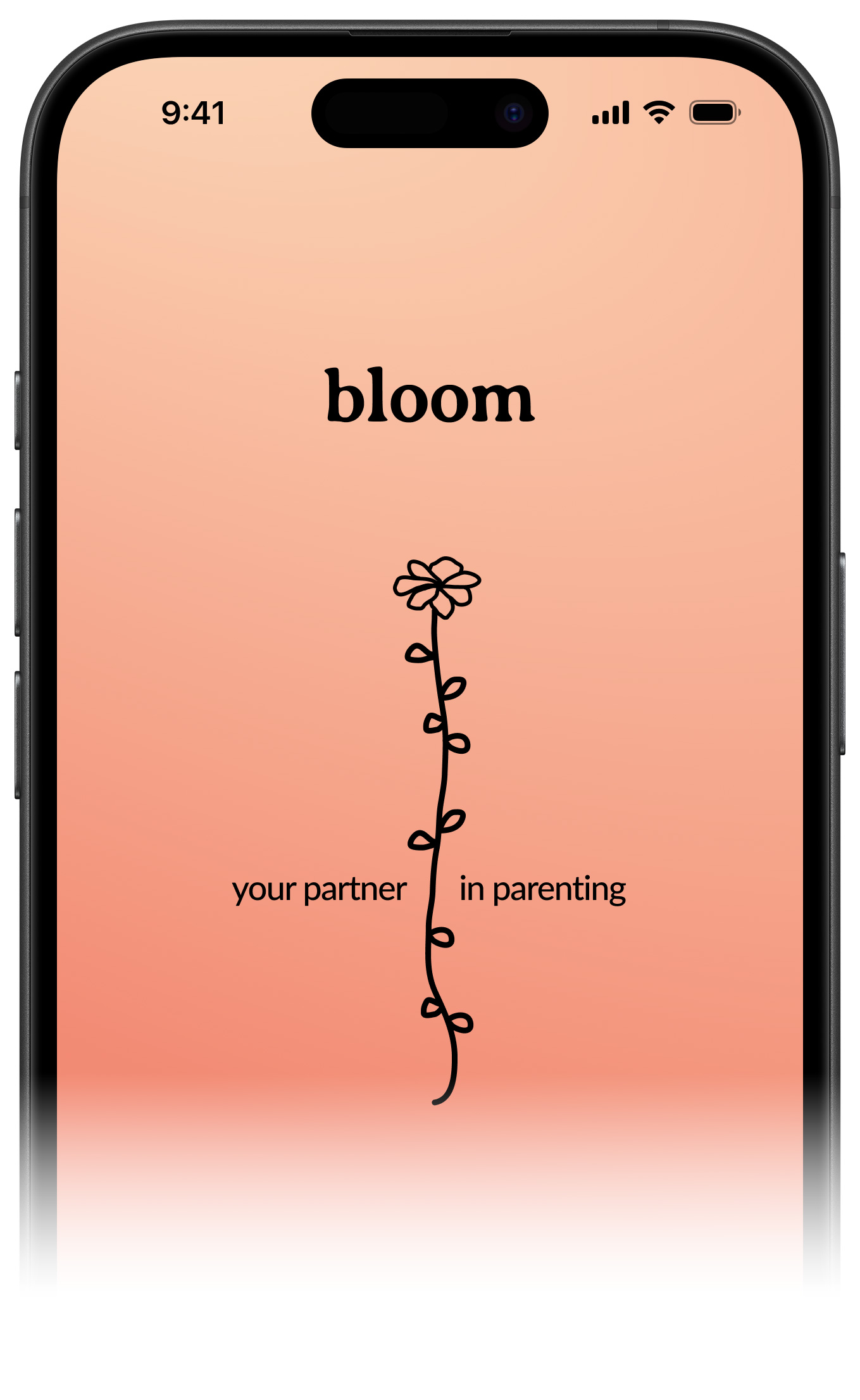
We envisioned Bloom to be a comprehensive yet intuitive digital platform that can truly help parents based on our research. The goal of this concept was to seamlessly integrate planning tools, expert-backed advice, and emotional support into a single platform.
Based on our process, we decided to more fully explore and test the following 4 key features of Bloom:
Feature 1
An interactive timeline
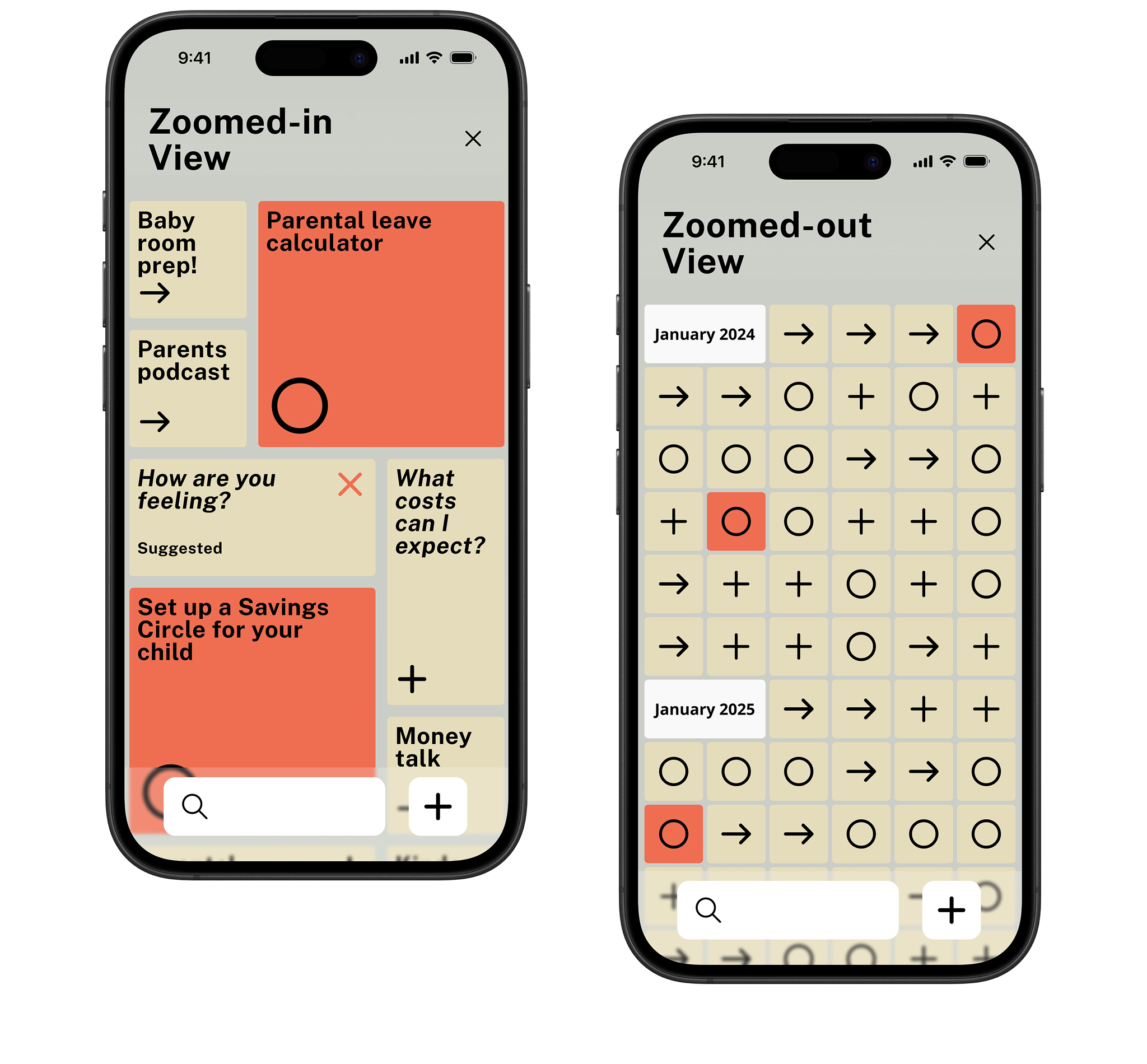
helping parents track both immediate tasks (such as babyproofing) and long-term goals (such as educational planning).
Feature 2
A parental leave calculator
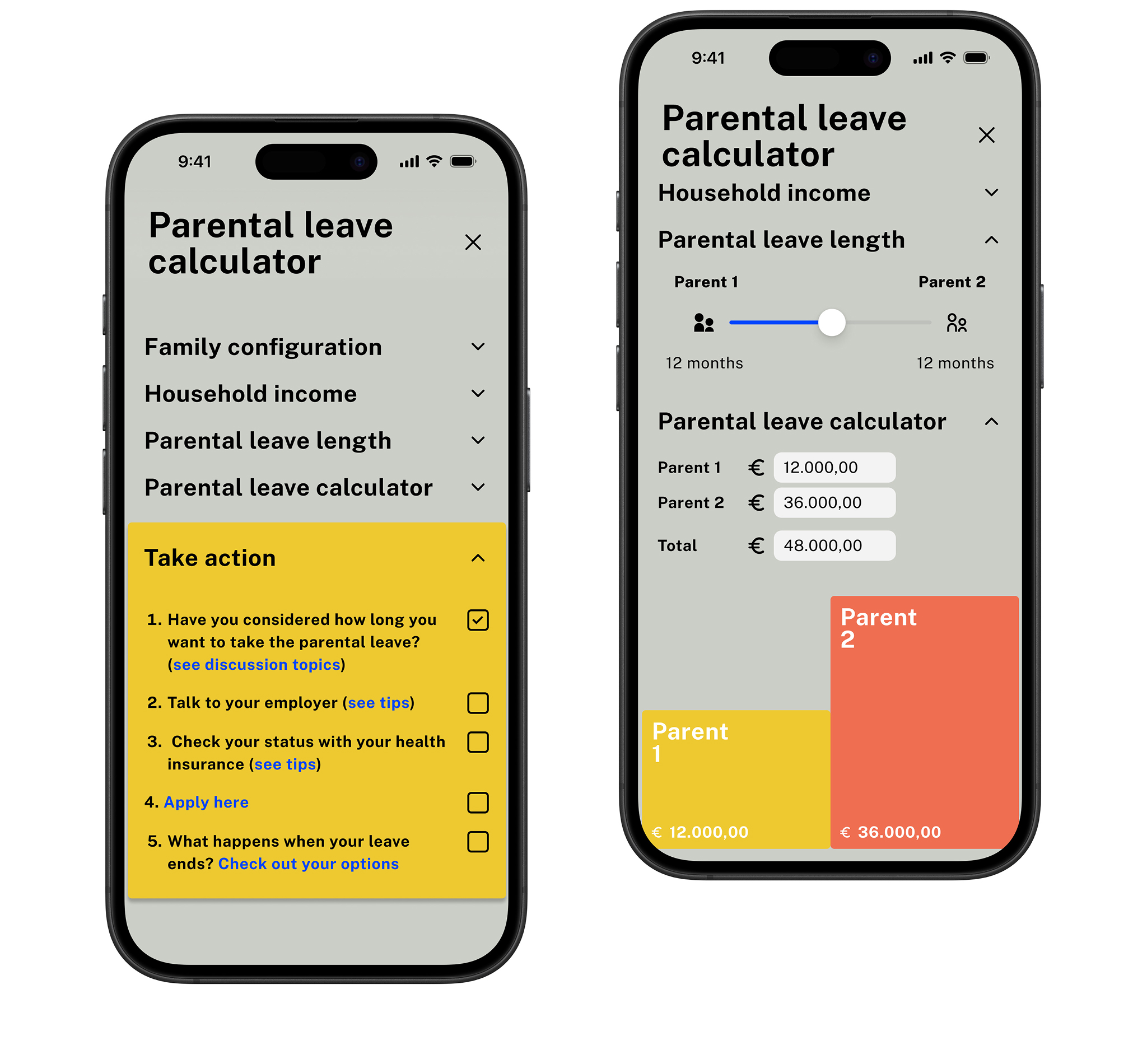
which simplifies complex policies and provides parents with clear, location-specific guidance on their rights and financial implications.
Feature 3
Savings circles
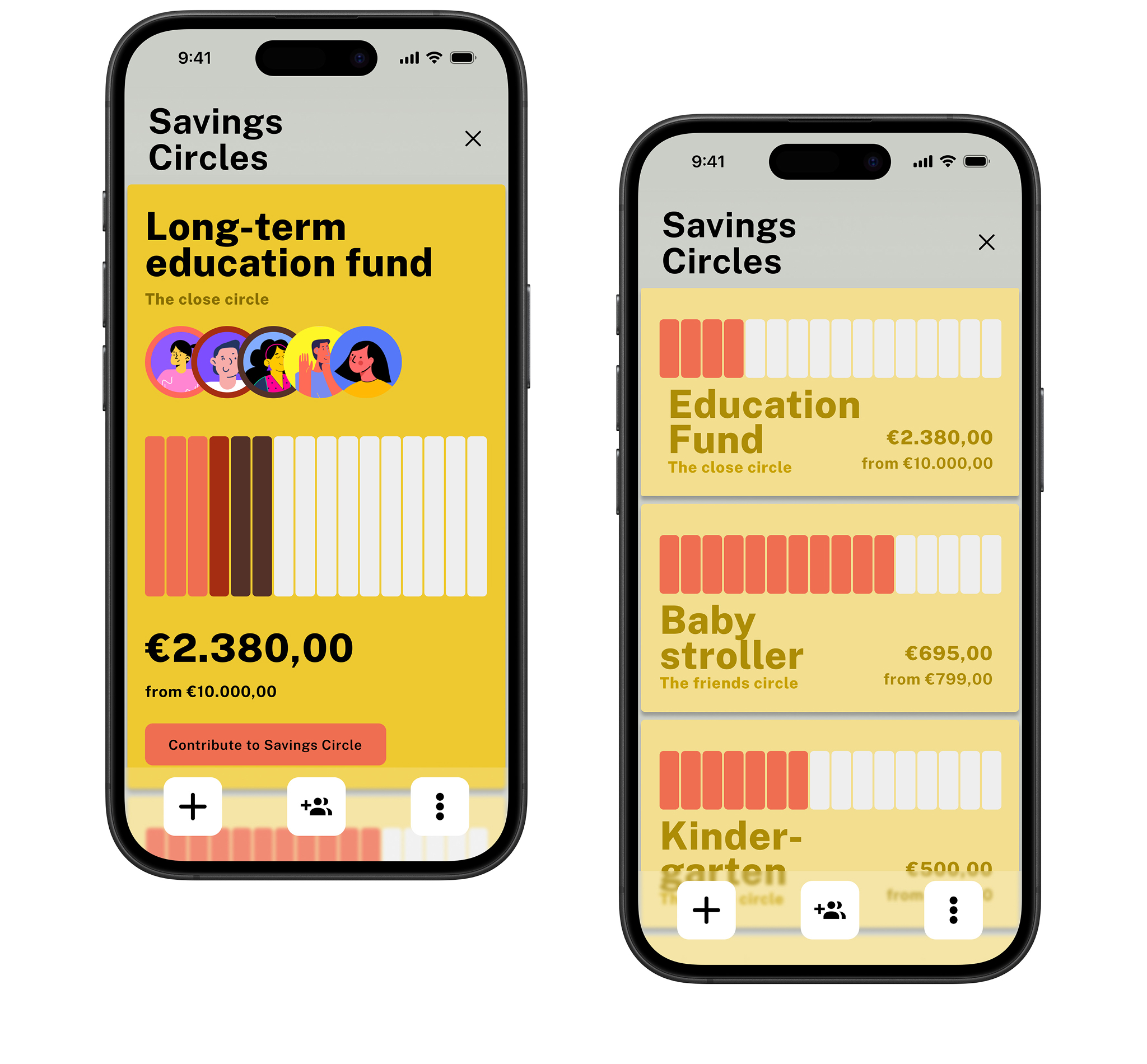
allowing parents to collaborate with family and friends on shared financial goals, whether for baby essentials or future education.
Feature 4
A digital keepsake
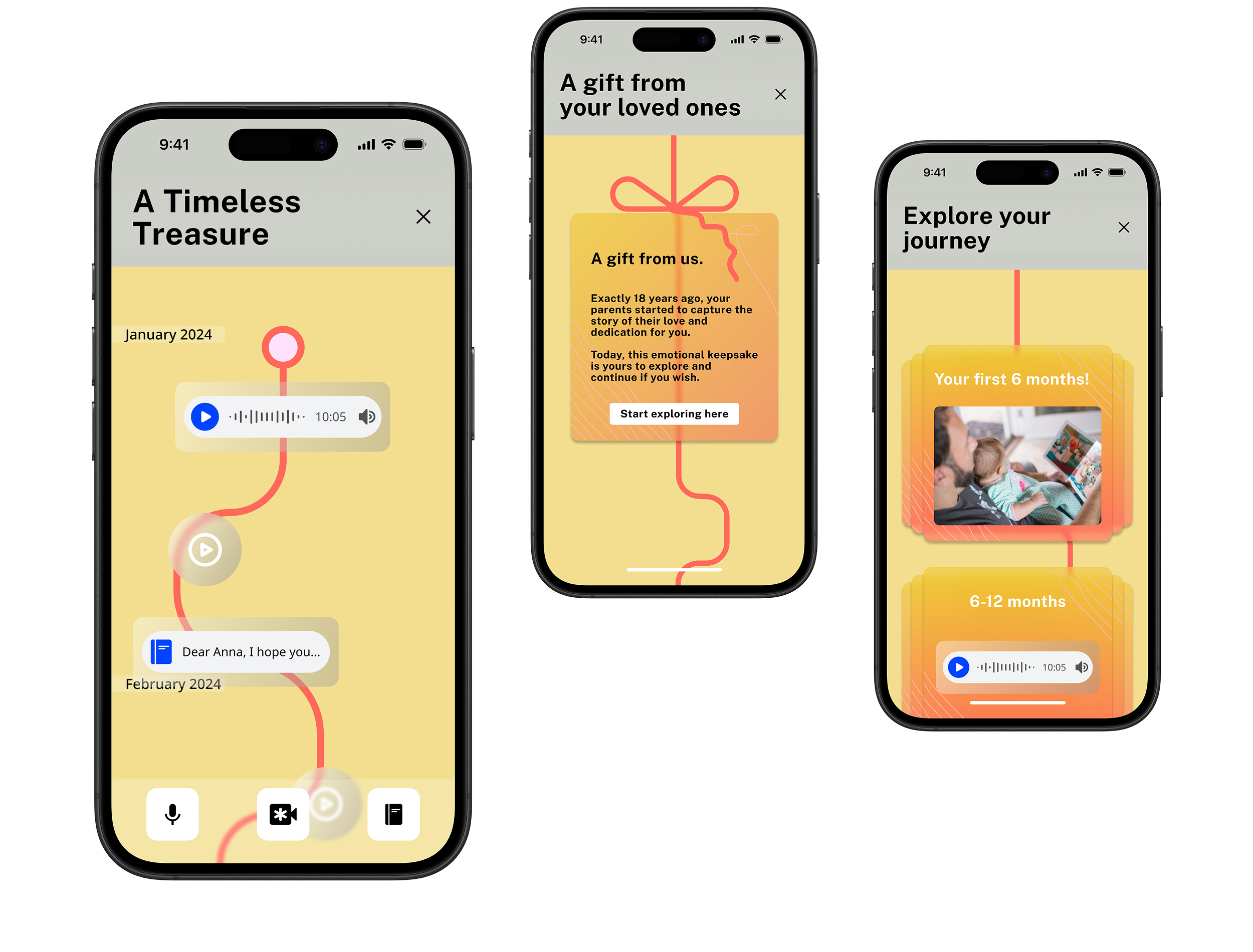
transforming milestones, messages, photos, and voice notes into a beautifully designed digital scrapbook that evolves over time.
Minor features
were also visually present on the tested landing page; all addressing various pain points we have identified in validation with present and future parents.
Insights from testing and feedback
The response to Bloom’s concept was overwhelmingly positive. Many parents expressed regret that a tool like this did not exist when they were expecting their first child. They highlighted the practical value of features that provided financial clarity, reduced administrative stress, and simplified long-term planning.
One parent shared, “I’m now very sad that this didn’t exist when I was pregnant because it seems to hold a lot of valuable information—especially the financial insights.” Another noted, “When you enter this new universe, you’re just like, ‘What do I have to do now?’ Bureaucratically, financially—this app would have been a lifesaver.”
Key themes emerged from our research. Parents stressed the need for clear financial guidance—simple tools to understand and plan upcoming expenses related to raising a child. They also valued time-saving features, like automated reminders and easy access to documents, which eased their mental load and let them be more present.
Trust and security were essential. Many were hesitant to share sensitive data and sought strong protection measures and partnerships with trusted institutions like banks or government agencies.
A sense of community also mattered. Parents appreciated collaborative features, such as shared savings goals with family, and digital keepsakes to securely preserve milestones and memories.
Our quantitative validation results largely mirrored the positive feedback from the focus groups (figure #). Participants rated Bloom’s first impression at 4.1/5, finding it welcoming, and trustworthiness also scored 4.1/5. Relevance earned 3.5/5, with expecting parents showing more enthusiasm than current parents—suggesting the app is more beneficial early in the parenting journey. Meanwhile, 3.2/5 for likelihood of regular use indicates that long-term engagement may depend on features remaining valuable over time.
Key learnings

While Bloom was well received and validated many of our assumptions, our research and testing also revealed areas for improvement. These takeaways will help us refine our approach and create an even stronger experience in the future.
- Faster Turnaround Cycles – While insights from people such as interviews and focus groups are an integral part of our process and irreplaceable, they also introduced friction. Coordinating sessions took time and effort, extending the overall process. Next time, we will implement a more structured timeline management to streamline research and decision-making.
- Simplicity Still Wins – Despite our efforts to keep Bloom’s landing page and features intuitive, some participants still found elements complex—especially in quantitative studies where additional context couldn’t be easily provided. Stripping back to the essentials will be a focus moving forward to make our concepts as understandable as possible.
- Less Is More – Parents appreciated the breadth of features but sometimes found them overwhelming and did not always understand we are probing and validating for multiple ideas. One respondent from our testing said “Narrow it down, focus on one thing, don’t try to fish in all ponds at once.” Next time, we will consider focusing on one or two core value adds to maximise clarity and engagement.
Time to collaborate
By addressing both the practical and emotional needs of parents, our platform concept proposes a vision of a future where parenting feels less overwhelming and more empowering. We hope that our research sparks further ideas on how to allow parents feel more in control, more supported, and less alone in their journeys.
We invite stakeholders—from financial institutions and tech developers to parenting organisations and policymakers—to explore how these insights could be integrated into existing platforms or developed as a standalone product.
We are not launching an app ourselves. Our process led us to consider a digital platform, but our research could have taken us in different directions, for example, these features could have been integrated separately into various existing solutions. We would love to explore those paths with collaborators who are interested in working on solutions for parents. We would be very happy to share our research and co-develop ideas. If you’d like to learn more about Bloom, or explore possible collaborations based on our research, please get in touch with us! We’re happy to share our findings and explore opportunities for collaboration.
